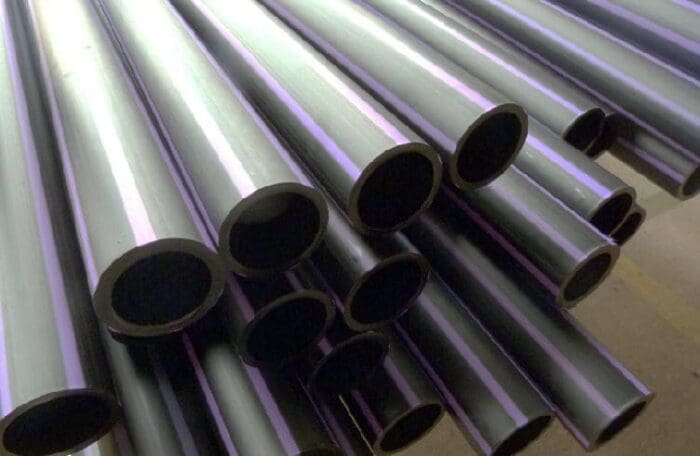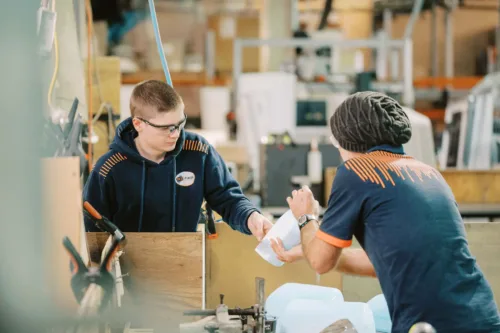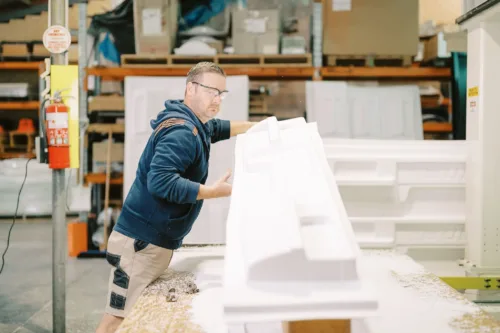

One of the most frequently used types of plastics is high-density polyethylene or HDPE. In this article, we will show you what is HDPE, how it is obtained and what it is most commonly used for. You will learn why it is such a popular material and what makes it special among other types of plastic.
HDPE: What Is It?
High-density polyethylene (HDPE) is a derivate product of petroleum, one of the three types of polyethylene invented by man. It was invented during the 1930s and its first application was for high-frequency radar cables. At the present, it is one of the materials in great demand all over the world because of its key benefits:
- Extremely high tensile strength
- Large strength-to-density ratio
- Corrosion resistance
- High impact resistance
- High melting point.
The most common HDPE examples from around the world are water pipes, containers for food, water and for various personal care items. Some of the cons of HDPE, making it unsuitable for specific applications, are:
- It is a highly flammable material
- It offers poor weathering
- It is sensitive to stress cracking
- It is difficult to bond – requires welding
FAQs about HDPE
Let’s focus on some of the most common questions people have about this material.
- Is HDPE Toxic?
No, HDPE in its final form is not toxic. Actually, high-density polyethylene complies with Food and Drug Administration standards for food contact. This means that HDPE is safe to use as a container for various kinds of food, including milk. By contrast to other types of plastic, HDPE components do not leak into the products stored in them. - Is HDPE Safe for Water Storage?
HDPE is the most common material used for water bottles and containers. It is a strong material, resistant to impact, thus, it can be used to transport water over the roads, without the risk of breakage and spillage. As it complies with FDA standards for food, it is also approved for use as a water container. - Is HDPE Recyclable?
Yes, high-density polyethylene is one of the easiest types of polymers to recycle. It is accepted at most recycling centres all over the world and can be reused many times without losing its properties and characteristics.
Real-World HDPE Examples
You know what HDPE is. You also know what are some its key characteristics, but where exactly can you see HDPE examples around you? Let’s take a look inside the average Australian home and see.
- Personal care items: shampoo, hair conditioner, face cream and cleansing tonic – all these products are stored in HDPE containers and jars
- Detergents: your laundry detergent, dishwasher liquid and all-purpose household cleaner come in HDPE bottles and containers
- Dry foods: cereal and snack boxes are usually lined with HDPE
- Frozen foods: the bag of frozen peas or spinach is made of moisture resistant HDPE
- Car products: gasoline, motor oil, coolant liquid and antifreeze liquid are stored in HDPE containers, because they are resistant to chemicals
- Toys: many plastic toys are actually made of HDPE, because it does not discolour under the effect of UV rays from the sun
- Water pipes: all the modern water pipes are made of high density polyethylene, because it does not corrode and is easy to form into various shapes
- Garden furniture: durable, resistant to moisture and a wide range of temperatures, HDPE is the ideal material for outdoor furniture
- Delivery boxes – most delivery companies use HDPE boxes to ship customer orders from the central warehouse to various local delivery hubs
- Artificial turf – many sports, like tennis or soccer, are played on artificial turf made of high density polyethylene, which is resistant to many people running on it
- Coatings for automotive wires – resistance to high temperatures and chemicals are the key reasons why HDPE is chosen for this purpose
- Plastic lumber – a modern and sustainable building material, plastic lumber is usually made of recycled HDPE bottles.
Find High-Quality HDPE Fabrication at BCJ Plastic Products
Knowing what HDPE is is one thing, and putting your project into practice is another. If you are looking for experts in HDPE fabrication in Perth, BCJ Plastic Products is your best choice. Get a quote online or call us on (08) 9353 3477 for professional advice and service.


Custom Plastic Fabrication: Exploring the Process and Possibilities
Read article

